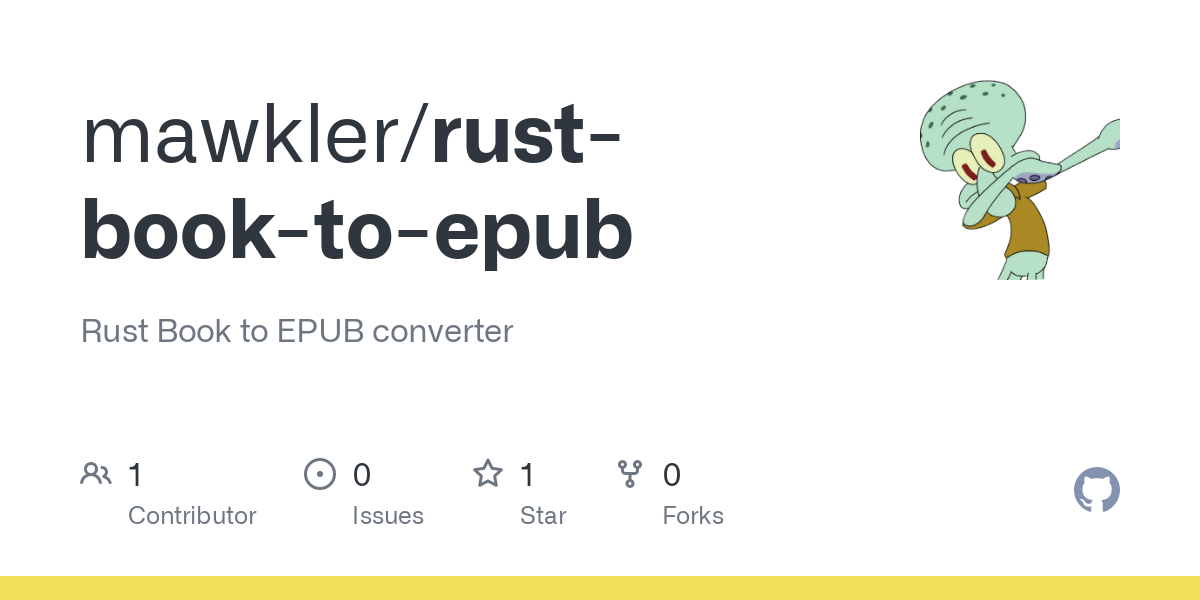- 26 Posts
- 83 Comments
Is fail2ban still maintained in the time of the fish & the mage?
- Jayjader@jlai.luto
 ·2 months ago
·2 months agoIn my ideal world, the population would be sufficiently educated about nutrition in fruit and vegetables that picture-perfect tomatoes that are picked unripe so that they survive long distance hauling would simply never sell.
delightfully on-the-nose
- Jayjader@jlai.luMto
 ·3 months ago
·3 months agoThe idea & execution are great, I just don't know that I would ever do this for collecting into
Vecs myself.When I'm tired of writing turbofish, I usually just annotate the type for the binding of the "result":
let d = [1i32, 2, 3]; let y: Vec<_> = d.iter().map(|x| x + 100).collect();So often have I collected into a vector then later realized that I really wanted a map or set instead, that I prefer keeping the code "flat" and duplicated (i.e. we don't "go into" a specific function) so that I can just swap out the
Vecfor aHashMaporBTreeSetwhen & where the need arises.
- Jayjader@jlai.luto
 ·4 months ago
·4 months agoFrom a technical point of view, given how federation via ActivityPub works, anyone can see votes on posts and comments. They "just" have to run an instance that federates.
User vote history wouldn't be as feasible, so your point still stands.
Sans avoir lu l'article : je croyais que le CO (monoxyde de carbone) était hyper nocif car il venait se lier aux globules rouges dans le sang a la place du CO2 et (surtout) n'est pas relâché par les globules dans les poumons mais occupe le globule jusqu’à sa mort...
- Jayjader@jlai.luto
 ·4 months ago
·4 months agoEn tant que "militant" pour le logiciel libre : CHEH
- Jayjader@jlai.luto
 ·4 months ago
·4 months agoJ’espère que ca fera au moins pencher certain-e-s pour du local et/ou libre pour leur prochains choix d’infrastructure numérique.
Mais bon, j'ai du mal a en avoir l'espoir.
J'ai bossé sur un Lenovo Thinkpad T480 14 pouces pendant environ 4 ans. Les Thinkpad c'est une question de goût, mais aujourd'hui encore je trouve que ses 14 pouces étaient un équilibre presque-parfait entre la compacité d'un 13" et la « surface de travail » d'un 15".
J'ajouterai que l'expérience avec Linux dessus était vraiment top, 100% du matériel était reconnu et fonctionnait etc.
J'avais pu opter à l'achat pour une batterie amovible surdimensionnée (72Ah) qui, couplée à la batterie intérieure fixe (~24Ah) me donnait presque 2 journées de 8h d'autonomie.
- Jayjader@jlai.luto
 ·4 months ago
·4 months agoLove the monochrome palette on this one
- Jayjader@jlai.luMto
 ·5 months ago
·5 months agohere's the recording: https://youtu.be/RI4D62MVvCA
- Jayjader@jlai.luMto
 ·5 months ago
·5 months agoBit of both, I suppose. Along with my own experience trying to deal with prototypes in JavaScript and how Python handles methods vs "bare" functions internally in terms of v-tables and "where" things exist in memory.
I imagine the fact that both of those are interpreted languages plays somewhat heavily into it.
With regards to being able to write
MyStruct::my_method(&my_var), it's the one-two punch of "I can use that specific syntax to differentiate between 'inherited' methods that have the same name" and that the compiler doesn't treat.method()calls any differently and just rewrites them as such when doing it's job.
- Jayjader@jlai.luMto
 ·5 months ago
·5 months agoI’m sure there are a bunch of patterns that emerge out of this (anyone with some wisdom here?) …
The classical one is something that looks like the following:
struct LoggedOut; struct User {name: String}; struct Admin {name: String}; impl LoggedOut { fn login(self, name: String, password: String) -> User { User { name } } fn admin_login(self, name: String) -> Admin { Admin { name } } } impl User { fn log_out(self) -> LoggedOut { LoggedOut {} } } impl Admin { fn log_out(self) -> LoggedOut { LoggedOut {} } } fn fetch_user_preferences(user: User) { /*...*/ } fn do_admin_action(admin_account: Admin) { /* ... */ } fn main() { let mut user_session = LoggedOut {}; /* (get user input) */ match input { "login" => { user_session = user_session.login(name, password); } "admin" => { user_session = user_session.admin_login(name); } } }This would prevent you from writing code that uses the user's info / session "object" after they have logged out (and/or before they have logged in). On its own it's naive and a bit encumbering - I expect an enum would make more sense but then you can't restrict via types which user session values can and can't be passed to specific functions. In any case, when you are building a whole system around it it can be very useful to have the compiler enforcing these sorts of things "in the background".
This is basically what Gary Bernhardt is talking about in the talk you linked.
- Jayjader@jlai.luMto
 ·5 months ago
·5 months agoI want to highlight one of the more subtle-yet-important clarifications made in these 2 chapters: associated functions vs methods, and how method calls are just syntactic sugar for function calls.
Unlike in many other languages, there is no formal distinction (e.g. via separate keywords) between methods vs constructors vs property getters. The first parameter as well as the return type determine if a given associated function is "actually" a constructor or a method (etc.).
Personally, I find this incredibly elegant; it's a form of "less is more" that gets out of my way when I'm coding while still allowing me to use all of the existing patterns that I know from elsewhere.
- Jayjader@jlai.luMto
 ·5 months ago
·5 months agoWe read from the intro to chapter 7 all the way through section 7.3 (Paths for Referring to an item in the Module Tree).
- Jayjader@jlai.luMto
 ·5 months ago
·5 months agoHere's the recording: https://youtu.be/pUqVmPRLhNE
- Jayjader@jlai.luMto
 ·5 months ago
·5 months agoHere's the recording: https://youtu.be/W1fjxCwtwfM
- Jayjader@jlai.luMto
 ·5 months ago
·5 months agoWe managed to get through the rest of the entire chapter! Next session will start chapter 7 (on packages, crates, and modules).
- Jayjader@jlai.luto
 ·5 months ago
·5 months agoNot necessarily cash, but definitely a bit of luck. Some lawyers, if they think a case is guaranteed to go your way, will do the work for free in exchange for receiving a portion of the damages the final judgement will award you. Even rarer, some lawyers care enough about some issues on a personal level that they'll work for free, or reduced rates, on certain cases.
In this case, I'm not sure there are any damages whatsoever to award to OP - a "win" is forcing the company to abide by the GPL, not pay up money. The EFF and the FSF, as others have brought up, are probably the best bet to find lawyers that would work on this case for the outcome instead of the pay.




Smart of Mata to tell them that. I like that they fight the hackers on their own "turf", so to speak, in the propaganda war. Makes their power and hegemony that much more believable.